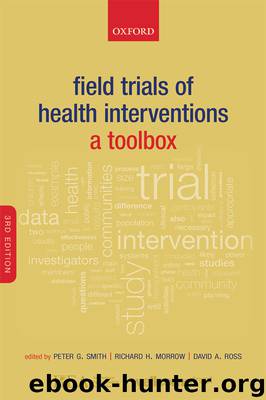Field Trials of Health Interventions by Unknown

Author:Unknown
Language: eng
Format: epub
Publisher: Oxford University Press
Published: 2015-06-18T16:00:00+00:00
3 Factors influencing choice of outcome measures
The choice of the outcome measures in a specific trial largely depends on the purpose of the trial and how relevant, feasible, and acceptable the measures will be in a particular study population. Furthermore, the choice may be constrained by economic, logistic, or ethical considerations.
3.1 Relevance
Interventions are generally designed to reduce disease and/or to promote health. The outcome measures chosen should reflect these objectives as fully as possible, but, when intermediate variables are used, rather than those of main interest, care must be taken to choose variables of direct relevance to the main outcome. This is not always straightforward. For example, it may be decided to assess the impact of a vaccine by measuring the proportion of individuals who develop antibodies to the vaccine. This may be reasonable if it is known that there is a high correlation between the development of antibodies and protection from clinical disease. For many diseases, however, this relationship has not been established, and it would not be warranted to base conclusions regarding protection against disease simply on antibody determinations.
A health education intervention may be designed to change behaviour to reduce disease risk, but, as discussed in Section 2.5.1, asking individuals if they have changed their behaviour may give a measure of impact that correlates poorly with true changes in the risk of disease. Are individuals responding truthfully? Are they doing what they say they do? Even if behaviour changes, is this associated with a lowering in the incidence of disease?
The outcome variable measured should be as close as possible to the outcome of main interest. While this may seem an obvious suggestion, it may have major impact on the design of a study. For example, if the prevention of death is of prime interest, then, whenever possible, this should be made the endpoint of the trial. To do so might require an increase in the size of the trial from hundreds to thousands, or even tens of thousands, of individuals. Such a large trial might be difficult to find funding for, and there may never be an adequate test of whether the intermediate variables measured are acceptable surrogates for effects on mortality.
Download
This site does not store any files on its server. We only index and link to content provided by other sites. Please contact the content providers to delete copyright contents if any and email us, we'll remove relevant links or contents immediately.
Rewire Your Anxious Brain by Catherine M. Pittman(18656)
Talking to Strangers by Malcolm Gladwell(13371)
The Art of Thinking Clearly by Rolf Dobelli(10489)
Mindhunter: Inside the FBI's Elite Serial Crime Unit by John E. Douglas & Mark Olshaker(9344)
Becoming Supernatural by Dr. Joe Dispenza(8218)
Change Your Questions, Change Your Life by Marilee Adams(7783)
Nudge - Improving Decisions about Health, Wealth, and Happiness by Thaler Sunstein(7709)
The Road Less Traveled by M. Scott Peck(7603)
The Lost Art of Listening by Michael P. Nichols(7506)
Mastermind: How to Think Like Sherlock Holmes by Maria Konnikova(7348)
Enlightenment Now: The Case for Reason, Science, Humanism, and Progress by Steven Pinker(7314)
Win Bigly by Scott Adams(7199)
The Way of Zen by Alan W. Watts(6615)
Daring Greatly by Brene Brown(6514)
Big Magic: Creative Living Beyond Fear by Elizabeth Gilbert(5775)
Grit by Angela Duckworth(5615)
Ego Is the Enemy by Ryan Holiday(5451)
Men In Love by Nancy Friday(5240)
The Laws of Human Nature by Robert Greene(5209)
